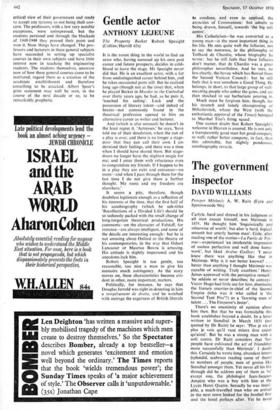Gentle actor
ANTHONY LEJEUNE
The Property Basket Robert Speaight (Collins/Harvill 63s)
It is the rarest thing in the world to find an actor who, having summed up his own past career and future prospects, decides in cold- blood to leave the stage. Mr Speaight never did that. He is an excellent actor, with a far from undistinguished career behind him, and he takes occasional parts still. But he realised long ago (though not at the time) that, when he played Becket in Murder in the Cathedral over thirty years ago, he had, as he puts it, `touched his ceiling'. Luck and the possession of literary talent—and indeed of brains—not commonly found in the theatrical profession opened to him an alternative career as writer and lecturer.
And (which is also unusual) he doesn't in the least regret it. 'Actresses,' he says, 'have told me of their desolation, when the run of a play is over, and there is no longer a stage- door that they can call their own. I un- derstand their feelings, and there was a time when I should have shared them. But stage- doors no longer have the slightest magic for me; and I enter them with reluctance even to congratulate my friends. If I happen to be in a play they are exits and entrances—no more—and when I pass through them for the last time I do not give them a further thought. My roots and my freedom are elsewhere.'
It seems a pity, therefore, though doubtless legitimate enough as a reflection of his interests at the time, that the first half of his autobiography (which he sub-titles `Recollections of a Divided Life') should be so tediously packed with the small change of long-forgotten theatrical productions. His comments—on the character of Falstaff, for instance—are always intelligent, and some of the details are interesting enough : but he is not amusing about Oxford or the theatre or his contemporaries, in the way that Osbert Lancaster or Maurice Bowra is amusing. His attitude is slightly impersonal and his anecdotes lack bite.
Robert Speaight is too gentle, too reasonable, too nice a man to give his memoirs much astringency. As the story moves on, these characteristics become evi- dent in other, more important, matters.
Politically, for instance, he says that Douglas Jerrold was right in detecting in him a temperament de droite, and he watched with outrage the eagerness of British liberals
to condone, and even to applaud, the atrocities of Communism : but admits to being drawn, himself, towards 'the big soft centre'.
His Catholicism—he was converted as a young man—is the most important thing in his life. He sees quite well the fallacies, not to say the nonsense, in the philosophy of Teilhard de Chardin, whose biography he wrote : but he still feels that these fallacies don't matter, that de Chardin was a great philosopher nevertheless. And he sees, no less clearly, the havoc which has flowed from the Second Vatican Council : but he still feels that it was somehow a Good Thing. He belongs, in short, to that large group of well- meaning people who unbar the gates, and are then shocked to see barbarians pouring in.
Much must be forgiven him, though, for his staunch and lonely championing of Mihailovitch, whom the West (with the enthusiastic approval of the Times) betrayed to Marshal Tito's firing squad.
One cannot doubt that Robert Speaight's welcome in Heaven is assured. He is not only a transparently good man but good company as well; rather better company, in fact, than this admirable, but slightly ponderous, autobiography reveals.






































 Previous page
Previous page